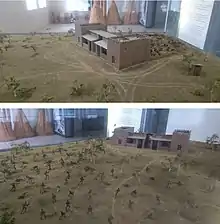Battle of Namutoni
The Battle of Namutoni fought between the militaries of the Ondonga kingdoms and German Southwest Africa on 28 January 1904 was part of an uprising against German Colonial expansion catalysed by the Herero Uprising to the south that started a few weeks earlier. It was fought at the site of Fort Namutoni in northern Namibia.[2][3]
| Battle of Namutoni | |||||||
|---|---|---|---|---|---|---|---|
 A diorama of the fort during the battle at the Fort Namutoni museum. | |||||||
| |||||||
| Belligerents | |||||||
|
| |||||||
| Commanders and leaders | |||||||
|
|
| ||||||
| Strength | |||||||
|
4 schutztruppe regulars 3 colonial reservists | ~500[1] | ||||||
| Casualties and losses | |||||||
| none |
68 killed 48 missing 20 wounded[2] | ||||||
The fort was held by four regular soldiers of the German Schutztruppe and three colonial reservists: Fritz Grossman NCO, Jakob Basendowski (NCO), Health Sergeant Bruno Lassmann and soldiers 1st Class Richard Lemke, Albert Lier, Franz Becker and Karl Hartmann. The fort was stocked with 1,500 rounds of ammunition.[3] Chief Nehale Mpingana of the Ondonga people led the attack on the fort. Mpingana was noted for his strongly anti-colonial stance having successfully attacked the Dorsland Trek-Boers in 1886.[2]
Continuous attacks on the fort by 500 Ondonga warriors lasted all day until slowing down in frequency as the day went on and eventually stopped in the afternoon. With only 150 rounds of ammunition remaining the defending Germans decided to retreat to the farm Sandhup 40 kilometres to the south on horseback during the night having incurred no casualties. The following morning the fort was sacked and destroyed by Ondonga forces claiming a number of cattle from the fort.[3]
Following the battle the fort was rebuilt and greatly expanded by the Germans.[3]
References
- "The Namibian". Namibian.com. 2018-01-30. Retrieved 2018-08-29.
- "Schutztruppe German South West Africa Fort Namutoni Northern Outpost Schutztruppe". www.namibia-1on1.com. Retrieved 2018-08-29.
- Jan, Ploeger (1989). "Fort Namutoni: From Military Stronghold to Tourist Camp". Scientia Militaria: South African Journal of Military Studies. 19.